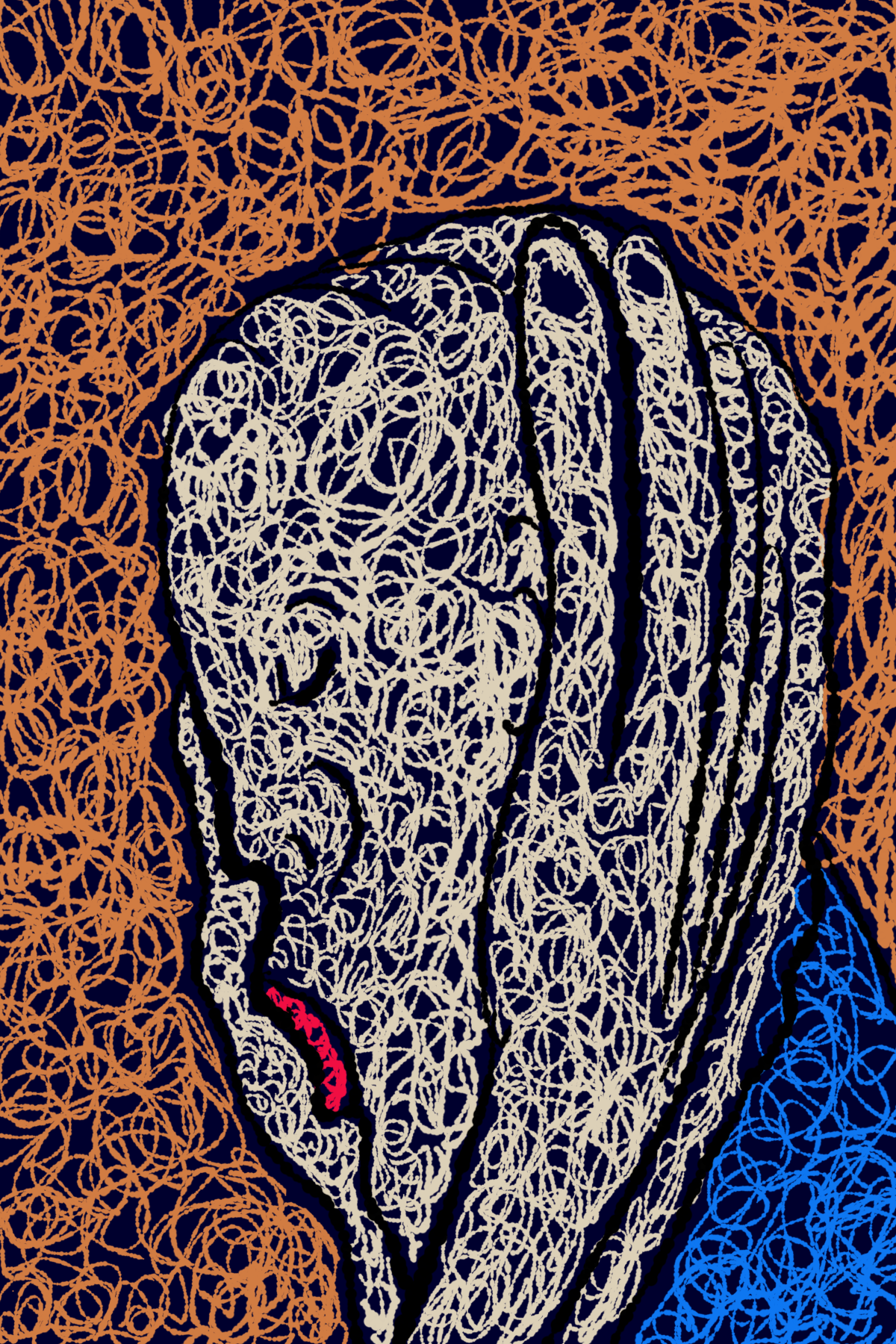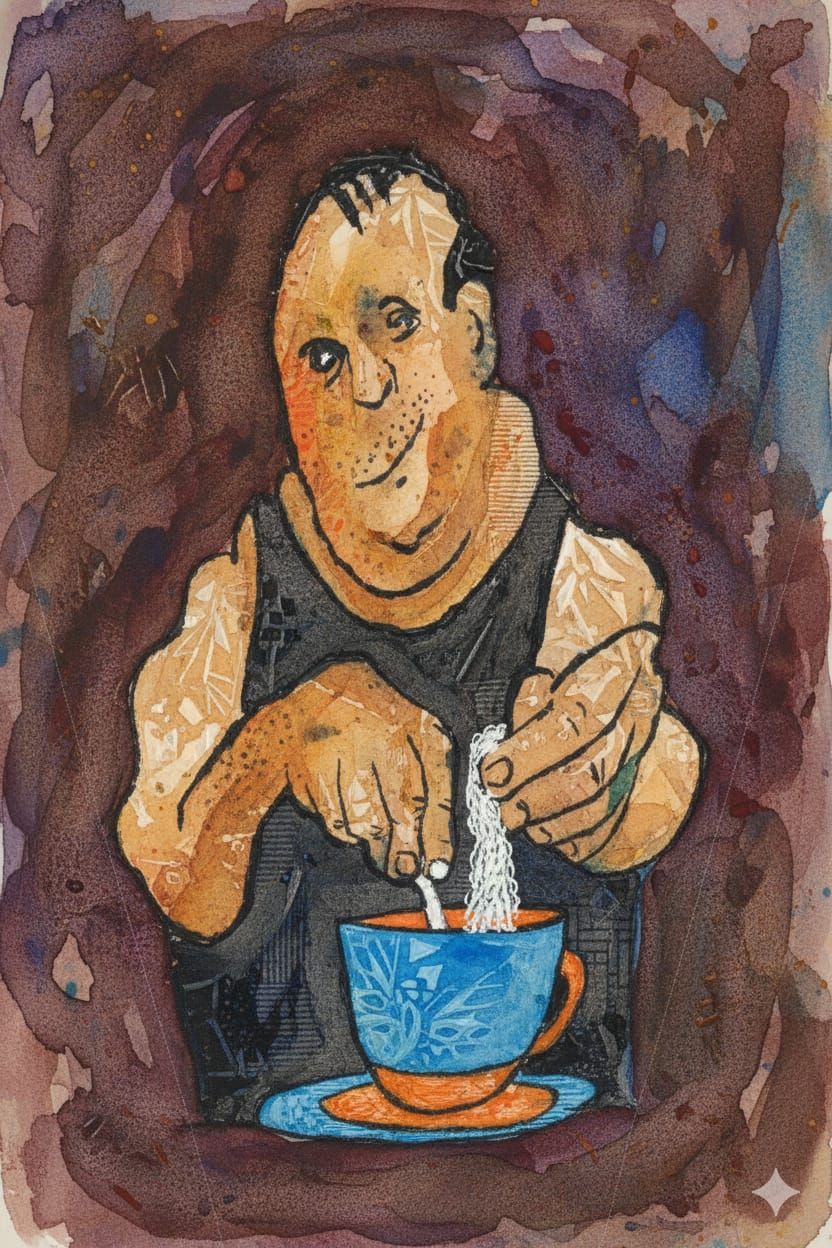Waking up Me
10/11/2025

Often when I feel depressed, I have to write. Writing is the only cathartic, suitable avenue for me to vent the inarticulate pain that my sort of bipolar depression hides in its simplistic misnomer, that people are prone to confuse with a subsidence in the level of normalcy—no, mine isn’t at all simply that. If you’ve read any of my previous posts, I have departed from normalcy long ago, and it’s really a question of how far red on the pathological scale—how psychologically bereft from the usual thought patterns that humans have, or how psychotic the paraphernalia of the aura that surrounds the lingering mood, ruminations, and headaches is. What differentiates one depressive attack from the next, sometimes, is that I have to write or draw or do something repetitive—like the squiggly lines that compose the illustration, until the monotony is exhausting and somehow throws in a spanner in the circuit and acts pharmaceutically like a depression brake. I fall asleep and then wake up disturbed. Often famished, and then I just heat up some water in a cup with some two minute Calcutta version economy-sized Maggie noodles.

Sometimes—often without warning—the sluice gates of memory fail, and the past, long held at bay, surges forward with a force that shatters the pitiful fortifications my mind had so painstakingly, so hopefully, erected. These fences were never truly walls; they were embarrassingly frail trellises draped in the illusion of strength, and against the pressure of remembrance they splinter at once. It’s the recent human unkindnesses that block their recollection, repressed when awake, but somehow during the rebooting from half asleep to wakefulness it’s hard to not remember the remote past when such unkindness hadn’t made their appearance. And thus I am transported back in time and then jolted forward to the unnerving present reality of not being able to put up with the strange stark contrast, and hurt following — the daggers stabbed are replanted and fresh injury, bleeding and pain is resurrected.
In that flood, the few fragile scraps of what could be called hesitant normalcy are swept away, dissolving into a kind of manic-depressive hyper-rumination that feels both involuntary and inevitable given my pathology. The pernicious thoughts circle inward like tightening rings, each concentric darker, heavier, more airless than the last, enclosing me layer by layer until the innermost shell is nothing but a noose of suffocating blackness in a room turned into a sepulcher.
It is here that reason abandons me, or I abandon it—I am never quite sure which. The sorrow, grown too large to manage, discards the pretense of resolution. The tools lie scattered and useless, stripped of their edges, as if they too have surrendered to the chaos.
There is then only one escape left: the enforced oblivion of forced sleep—yet another one in the brittle tapestry of comatose moments. I force myself sink into it, as into a warm, heavy liquid, and when I wake, I descend again into its depths, repeating the cycle until I am submerged in the final, fatal stages of that induced deep, irrepressible and oppressive melancholy—a melancholy whose gravity stronger than a black hole pulls me, without resistance, into still deeper, duller darker depths where despair loses even the energy to call itself despair.
But it is in the earliest moments of waking from these forced but weak sleep contracts—when the boundaries between dream and recollection have not yet hardened into the inflexible clarity of day—that I find myself most estranged, most violently dislocated. The mind, that nostalgic liar, still inhabits the soft light of a different life, still wears the skin of a younger self. There, in that thin-fogged interstice between sleep and consciousness, I wake up not in Calcutta, not in this slackening city of heat and noise and unrecoverable age, but in that other faraway sterile place—San Antonio in the US—where my sense of self had once begun to arrange itself as a younger man into a hopeful, coherent meaning, like a symphony—that now lies broken into discordant fragments, into half forgotten fibs and fancies, like the fog and haze of a dark Calcutta night.
I do not wake into sadness. I wake into confusion. And then, almost immediately, into revulsion. There is a violence in the recognition that the room I expect—the soft-furnished echo of a more ancient but younger existence—is not the one that receives me. Instead, I am met by the stale, humid reality of this one: this room with its industrial exhaustion, this air thick with a weariness that was never earned, this body—sweating, gapped of tooth, bowed by the slow sabotage of time—who stares back at me with the unsparing and uninspiring gaze of a mirror that does not lie, not even to spare me a second.
This is not a lament. It is not another act in the grand tragic opera of a depressive. I do not seek pity or consolation, for there is no listener gentle enough, and no ear that would not flatten the tune into cliché. What I am recording—what I must, lest it dissolve into vapor—is the horror of the exact moment when an old man in Calcutta realizes that the last dwindling glimmers of what once passed for a sustaining flame are now flickering into death, one after the other. Not dramatically. Not even noticeably. But with the quiet, surgical precision of inevitability—and even if my life means nothing to anyone else, as long as I am alive, it is all I have, and these stories of its ebbing away I want to stow away.
Already I have surrendered, not in posture, not in confession, but in that deeper, slow erosion where one continues to act out the farce of participation peculiar to Indians or Bengalis—where the veneer of obfuscation is stranger than in the west and requires more work to pretend. I cook, I clean, I reply, I pretend to matter as an independent self-made man—if not to others, then at least to the inner auditor who keeps record of whether I “tried.” And I have tried. By god or whatever godless logic rules this universe—I have tried. And I want the record to show it. That even if all else fails and my name is forgotten, anyone who ever crossed paths with me, even in disdain, would admit—yes, tenacity was there, even in the ruins.
But I know, I feel, that the spring is winding down. The machine is folding into itself. The internal alarms that once rang as melancholia or madness now simply murmur—this is the biology of it, this is the neurology of surrender. It arrives not as a crash but as a soft grinding. The bipolar mind knows this well: it eats from within, it feeds on itself, whether by conscious gnawing or from within concentric shells of unconscious dread—each shell cracked open by nightmares that wake me with no name, no memory, just an aftertaste of catastrophe.
More than once, I have woken certain I was still there—in that cramped apartment in Texas, that old life with its American catalog of simpleton joys and plaintive irritations, its familiar wallpaper of companionship and small duties. I expect the fabric of the sheets, the texture of the carpet, the particular hot Texan draft that passed through the window or door when they were closed to the air conditioning, the habits of furniture and affection of a few samaritan bengalis. But the waking kills it. What I find is not just another place, but another person—I wake not only elsewhere but as someone else, someone older, someone lonelier, someone whose story is so violently severed from the one I remember that I sometimes think I am waking in another life entirely, a distorted future I did not write but was somehow sentenced to.
This place—this Calcutta of now—is not the one I was born into. It is a hallucination of entropy, a fevered hallucination I never even had in my worst psychotic dream as a boy. I have not merely returned. I have been returned. By what logic? By what cruel and indifferent author? I do not know.
But I write it down. Because if I don’t, I will become one more detail that disappears—probably this blog itself won’t survive the rapacious entropy of constant renewals and funds which I won’t have. My life is a life traced in the faintest of threads, embroidered not in substance but in the gauze of gossamer bengali dreams—so light they dissolved at a breath, so fragile they could never bear the weight of waking. Always wished for, always pursued with an urgency that felt like purpose, yet leading, again and again, not to fulfillment but to the looping corridors of return—each failed arrival folded into the next as fuel for a private, repressed combustion. And so the chase itself became the only enduring reality, the dreams feeding the madness, and the madness, in turn, weaving ever more intricate tapestries of what might have been.